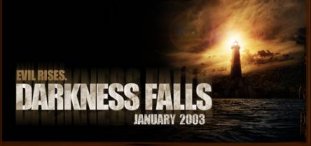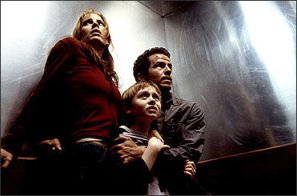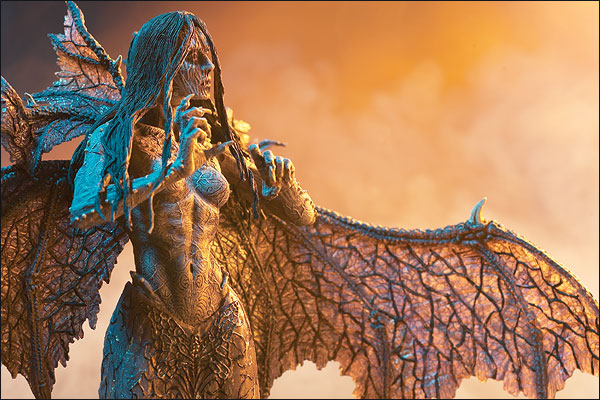
All the pieces are there.
You’ve got your creepy little town with an age-old curse on it. You’ve got your children sharing a secret terror that they can’t get the adults to believe. You’ve got your vengeful monster/ghost with an air of tragedy about her just for good measure. Best of all, you’ve got a cast mostly made up of unknowns so you can pretty much kill off anybody at any time and the audience will be right there with you. Throw it all together and you should get more than a ham-handed mess with no clue as to who to blame. But in Darkness Falls, the whole is so much less than the sum of its parts.
What makes this more painful is a really good first ten minutes. After a brief prologue montage that explains the curse on the town, we meet young Kyle Walsh (Joshua Anderson). On the cusp of leaving childhood behind, Kyle muses over the loss of his last baby tooth and the impending junior high dance.
He will ask Caitlin Greene (Emily Browning, the little girl stuck in Ghost Ship), his best friend and clearly, in a steal from Stephen King, already his soul-mate. After placing his tooth under his pillow and bidding good-night to his model boats and Incredible Hulk Rage Cage (nice detail), Kyle has one last rite of passage: The Tooth Fairy.
That’s the curse of Darkness Falls, you see. One hundred and fifty years earlier, all the children in town loved Matilda Dixon, a spinster who gave out a gold coin for every tooth. Unfortunately, through the usual tragic chain of events, Matilda suffered disfigurement, shame, and eventual hanging for a crime she did not commit. From the gallows she swore to return whenever a child loses his last tooth, and if the child sees her face (or, to be strict, the porcelain mask she used to cover her face), she will kill him.
With that kind of attitude, you have to wonder about the “children loving ‘The Tooth Fairy'” thing.
Kyle’s confrontation with the ghost plays out with just the right suspense, and though we don’t get a good look at her, he does. For the crime of not believing her son, Kyle’s mom dies horribly, and Kyle gets shipped off to a mental institution. Or maybe to a foster home. We actually get told both options.
The only thing the movie might have done better at this point would be to have left the identity of the monster in the dark, and let the kids know more than we do. It would have been the last chance for such a moment. From here on out, if there’s an utterly stupid decision to make, every character makes it.
Twelve years have passed, and the grown-up Caitlin (Emma Caulfield) has a little brother who, too, has seen the face of The Tooth Fairy. Hospitalized and terrified, young Michael (Lee Cormie) hasn’t slept in three weeks. Though the doctors have no clue what to do, Caitlin has an idea: call Kyle and see how he has survived the intervening years. The answer is not well. Now grown and looking far older than the 22 the script says he is, Kyle (Chaney Kley) comes home anyway to see if he can help the boy.
Then it’s just cliché after cliché, in both the dialogue and the action as the filmmakers try to fit in every horror film convention they can. Sometimes people think Kyle killed his mom, sometimes they don’t. But a childhood friend does still tell him, “you left behind a lot of s***,” meaning that Caitlin has pined for him. They were ten. If she has loved him all this time, why wait twelve years to call? (Okay, we can forgive the teen years, perhaps, because her parents might have forbid it. But they’re now clearly dead, because she’s the sole guardian of Michael.)
And now that I think about it, how the hell did she know where to find Kyle anyway?
In the absence of logic, the movie decides to just go fast, a jarring change of pace after the elegance of its opening. Throwing all caution to the wind, The Tooth Fairy just starts picking off random townspeople (but making them look at her face first).
The only thing that hinders her is light, whether it be by flashlight, fluorescent light, or firelight. Moonlight is okay, except when the script can’t figure out any other logical light source.
Again, luckily for the ghost of Matilda Dixon, this town is full of stupid people. Not only does everybody know the legend of her curse, not only do they have over one hundred years’ worth of unsolved child killings (“Wow! That wild bear or whatever it is that keeps breaking into houses and clawing kids to death sure must be OLD!”), but nobody actually believes Kyle.
So when he says, “take a flashlight,” no one really wants to do it. When he says, “don’t shoot out the lights!” to the cops trying to shoot The Tooth Fairy, naturally they do. When faced with a choice for treating Michael, Caitlin can either have him take anti-psychotic drugs like Kyle, or put him into a sensory deprivation tank for a few hours, “- to prove to him that there’s nothing to fear in the dark. Which would you choose, and wouldn’t the hungry moaning of The Tooth Fairy every time you’re near a shadow tip you off?
Finally, when the ghost attacks a police car, and the police deputy admits she must exist and is trying to take out the siren lights, does he think to turn them on? Noooooo.
To be fair, the supreme being himself must hate the town, because on the very night that The Tooth Fairy suspends all her previous rules about who and when she can attack, a storm hits that knocks out all the power. No power, no lights. In His infinite wisdom, He also decrees that no flashlight can function past the point it initially scares off The Tooth Fairy.
And yet, this could have been so good.
The surviving script has little touches that hint at cleverness, or at least thought. Kyle moved to Las Vegas, a city that has lights 24/7. It’s also quite possible that somewhere on the cutting room floor, there are scenes in which all the children who once believed have to deal with their adult denial. The only clue lies in the subtext of a lost friendship between Kyle and the deputy Matt (Sullivan Stapleton), a character we never see as a child, and Kyle’s accusation that “…you know the stories.”
Maybe I’m just an optimist, but the movie stinks of arbitrary chopping of scenes that would have developed things further. Again, the first ten minutes testify to that possibility. Every adult character, including Kyle, is little more than a cardboard puppet going through the motions. And the final film is only 74 minutes long, so there was time to let things play rather than just ride a mad mouse through a series of killings.
It could be that once again, we have fallen victim to the studio’s need for a PG-13. The Tooth Fairy has the courtesy of doing all of her actual killing offscreen, to unintentionally hilarious effect. Like a yo-yo, she swoops into the frame, pausing only long enough for a quick close-up of part of her mask, then pulls her victim up into the yawning ceiling of whatever building they’re in. (Nineteenth Century hospitals are great for this.) Eventually the victims’ slashed bodies bounce back to the floor.
If we can’t understand a monster emotionally, at least make it cool. Even Jason Voorhees in his implacability still generates some sort of response, occasionally even a misplaced empathy. But Matilda Dixon is just an ugly old lady who really could have used a catchphrase.
After watching the movie, I had a nagging feeling that I had seen something cooler in pre-production, and sure enough, I was right. Todd McFarlane released a Tooth Fairy figure in his Movie Maniacs line last month, and it’s strangely beautiful. The figure has a melancholy air, as if it knows that its movie sucks. And on McFarlane’s website lies a little disclaimer: “based on an early design.” Yeah, a cool early design.
There are vestiges of that design in the final monster, but it’s hard to tell, because the movie plays its appearance too close to the vest. But gone is its melancholy, gone is its terrible beauty that might seduce children into taking a fatal peek.
Fanboy Planet is an Amazon affiliate. Purchases made through links on this and other pages may earn us a commission.



